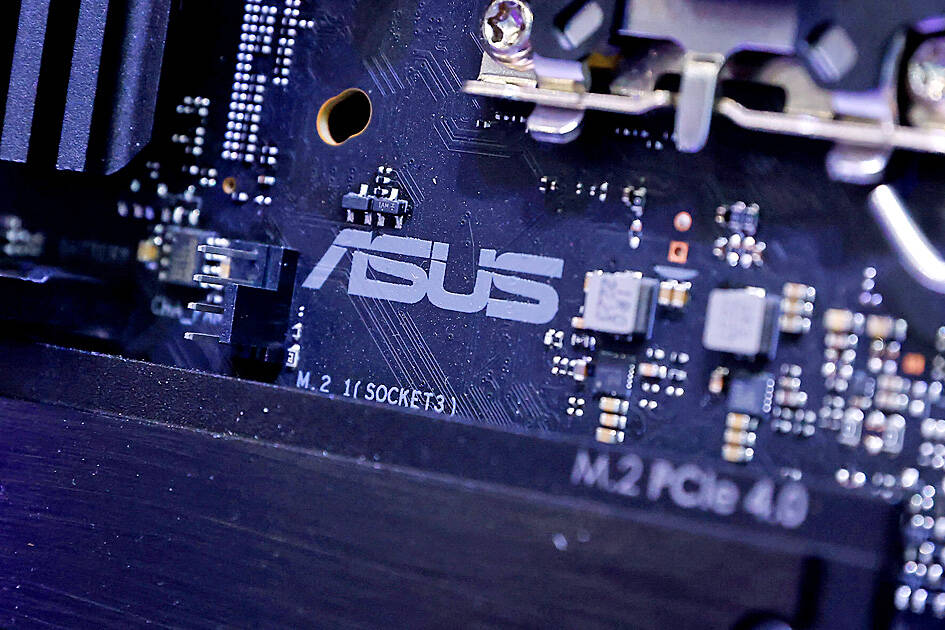PC vendor Asustek Computer Inc (華碩) is restructuring after posting its first quarterly losses in four years last quarter, it said yesterday.
The company hopes to expand its commercial PC market share to 10 percent from 5 percent, Asustek cochief executive officer Samson Hu (胡書賓) said at an online media briefing.
Commercial PC business is the second-biggest business group of the company, with a headcount of 540, Asustek said.

Photo: REUTERS
Asustek hopes to safeguard its leading position in the gaming PC market, Hu said.
The restructuring would not lead to massive layoffs, Hu said, dismissing media reports that the company was planning to cut up to 800 jobs.
Only a very small number of positions could be axed, as the company has about 600 vacancies that need to be filled, he added.
“The company’s structural adjustments do not aim to cut jobs, but to optimize the company’s operations and improve its agility, allowing the company to quickly respond to rapid market changes,” Hu said.
The global PC industry has faced challenges over the past few quarters in terms of macroeconomic conditions, supply chain issues and consumer demand, Hu said.
Asustek reported net losses of NT$3.82 billion (US$124.33 million) last quarter, which the company blamed on high channel inventories and disappointing PC sales.
Under the company’s restructuring plans, Asustek has divided its businesses into three categories: the consumer product business group, commercial product business group and mobile product business group. Gaming PCs would be included in the consumer product business group.
Asustek gaming PC business head Chang Yang-kuang. (張仰光) is to oversee the company’s consumer product business group, while Chang Kai-shun (張凱舜) would take charge of the commercial product and mobile business groups.
The adjustments are to take effect on July 1.

Sweeping policy changes under US Secretary of Health and Human Services Robert F. Kennedy Jr are having a chilling effect on vaccine makers as anti-vaccine rhetoric has turned into concrete changes in inoculation schedules and recommendations, investors and executives said. The administration of US President Donald Trump has in the past year upended vaccine recommendations, with the country last month ending its longstanding guidance that all children receive inoculations against flu, hepatitis A and other diseases. The unprecedented changes have led to diminished vaccine usage, hurt the investment case for some biotechs, and created a drag that would likely dent revenues and

Global semiconductor stocks advanced yesterday, as comments by Nvidia Corp chief executive officer Jensen Huang (黃仁勳) at Davos, Switzerland, helped reinforce investor enthusiasm for artificial intelligence (AI). Samsung Electronics Co gained as much as 5 percent to an all-time high, helping drive South Korea’s benchmark KOSPI above 5,000 for the first time. That came after the Philadelphia Semiconductor Index rose more than 3 percent to a fresh record on Wednesday, with a boost from Nvidia. The gains came amid broad risk-on trade after US President Donald Trump withdrew his threat of tariffs on some European nations over backing for Greenland. Huang further

CULPRITS: Factors that affected the slip included falling global crude oil prices, wait-and-see consumer attitudes due to US tariffs and a different Lunar New Year holiday schedule Taiwan’s retail sales ended a nine-year growth streak last year, slipping 0.2 percent from a year earlier as uncertainty over US tariff policies affected demand for durable goods, data released on Friday by the Ministry of Economic Affairs showed. Last year’s retail sales totaled NT$4.84 trillion (US$153.27 billion), down about NT$9.5 billion, or 0.2 percent, from 2024. Despite the decline, the figure was still the second-highest annual sales total on record. Ministry statistics department deputy head Chen Yu-fang (陳玉芳) said sales of cars, motorcycles and related products, which accounted for 17.4 percent of total retail rales last year, fell NT$68.1 billion, or

Macronix International Co (旺宏), the world’s biggest NOR flash memory supplier, yesterday said it would spend NT$22 billion (US$699.1 million) on capacity expansion this year to increase its production of mid-to-low-density memory chips as the world’s major memorychip suppliers are phasing out the market. The company said its planned capital expenditures are about 11 times higher than the NT$1.8 billion it spent on new facilities and equipment last year. A majority of this year’s outlay would be allocated to step up capacity of multi-level cell (MLC) NAND flash memory chips, which are used in embedded multimedia cards (eMMC), a managed